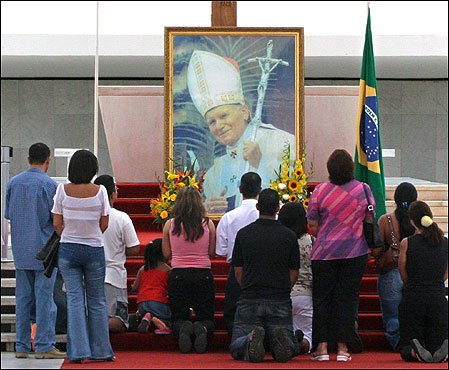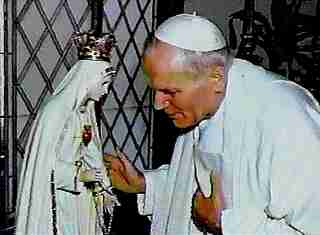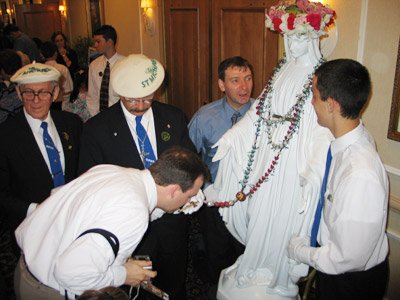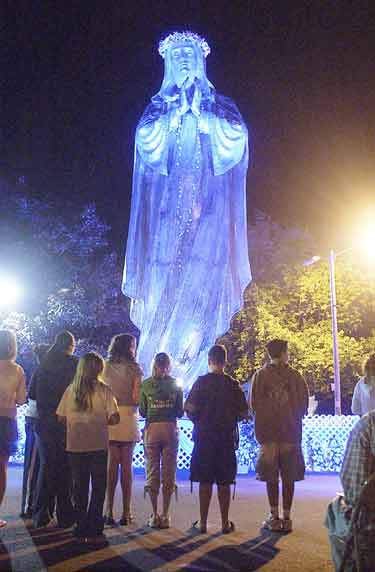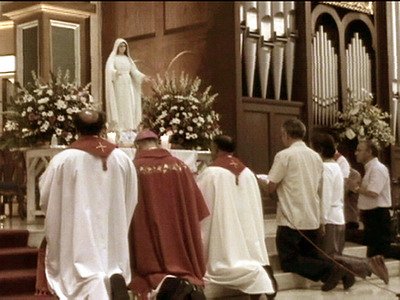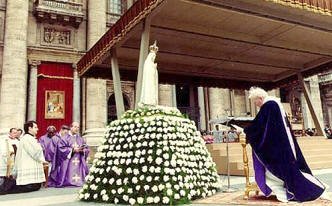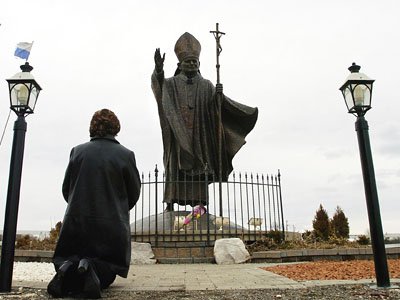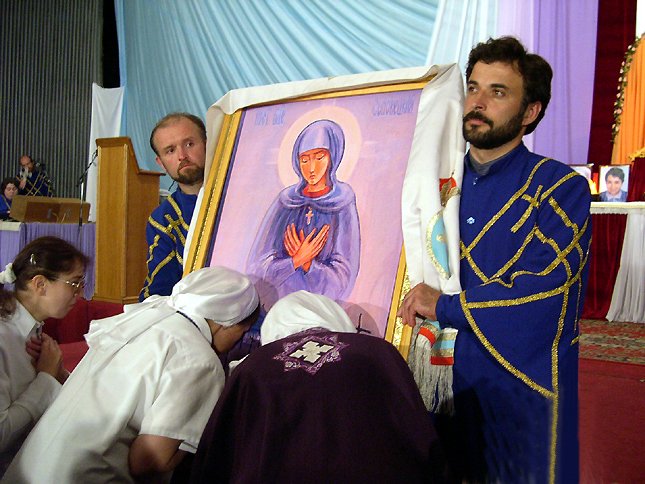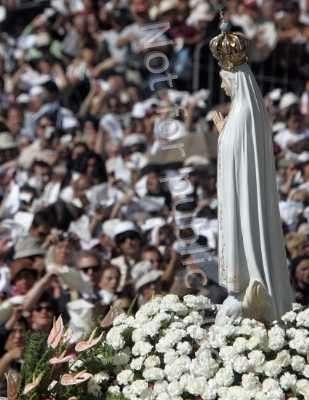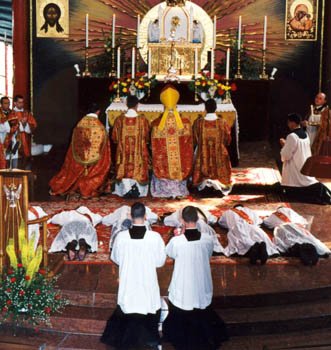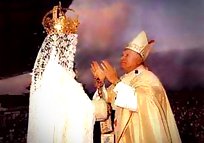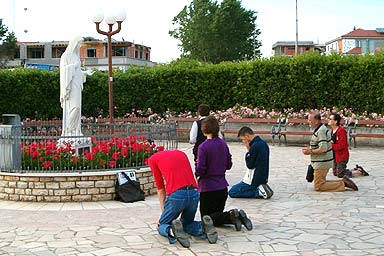trinity in the Holy Quran
your ultimate refernce
peace .
I planned to post such study very early in the thread when I started posting the item (trinity), but I postponed it due to the lack of some sources weren't available yet on my PC...... when It became available ,that motivated me to post.....
I intend the following study ,to cover the matter of (trinity in the Holy Quran) in depth ..... providing comparative linguestic,contextual analysis , quoting the Quranic commentaries and the objective work of non-muslims ,talks about the matter... also refute the dogmatic ,radical non-muslims with all their points of criticism ......
dear readers to the thread , though I know most (if not all) of you did read something on the topic online ... yet I'm sure ,inshaAllah you are going to read new lines in that study .......
Though I think the study cover everything on the issue....I will appreaciate lots any non-muslim comment on my posts... adding whatever what they think to be missed,or countring my arguments.......
Chapter 1 :Allah and the spirit
A Muslim Christian dialogue
Christian: How do you think, the Quran views the christian believe in the trinity?
Muslim: the belief of the trinity is just one chapter of the book of shirk …The overwhelmingly powerful assertion in the Quran that God is absolutely one rules out any notion that another being could share his sovereignty or nature …..
The Quran’s view the Christian doctrine of the Trinity involves an association of creature with God the creator, an infidelity that participates in the pagan infidelity of polytheism....
Some items need to be understood, in order to evade confusion
...
(1) Shrik
What is Shirk ? it could be described in several ways:
(1) “Shirk-ul-Ilm is to ascribe Knowledge to others than God.”
(2) “Shirk-ut-Tassaruf is to ascribe power-to-act-independently, to anyone else than to God.”
(3) “Shirk-ul-Ebada is to ascribe a partner to God who can be worshipped, or worshipping the created instead of the Creator.”
(4) “Shirk-ul-‘Adat is to perform ceremonies or follow superstitions.” Among the above mentioned, is that Muslims believe that when Christians worship Christ or adore Mary, this is Shirk-ul-Abada; and when Christians say Christ intercedes by his power or merit, it is Shirk-ut-Tassaruf.
shirk is strongly condmned in numerous Quranic verses, such un-forgiven act of blasphemy:
Holy Quran 4:48 God does not forgive anyone for associating something with Him, while He does forgive whomever He wishes to for anything besides that. Anyone who gives God associates has invented such an awful offence!
etc ...etc.........
Allah
Some non-Arab readers (Christians and Muslims alike) confused the term God (as understood by Christians) and the term Allah (God) (as understood by Muslims)
What is God according to Christianity?
The Christian doctrine of the Trinity defines God as three divine persons Father, Son,and Holy Spirit distinctly coexisting in unity as co-equal, co-eternal, and consubstantial , or of one being According to this doctrine, God exists as three persons but is one God, meaning that God the Son and God the Holy Spirit have exactly the same nature or being as God the Father in every way. Whatever attributes and power God the Father has, God the Son and God the Holy Spirit have as well. "Thus, God the Son and God the Holy Spirit are also eternal, omnipresent, omnipotent, infinitely wise, infinitely holy, infinitely loving, and omniscient."
(wiki)
What is God, according to Islam?
He is the entity that sent Jesus and appointed for him a mission...Christians would like to call such being by (the father) .... Well, though I think he is a father of no one... I won't prohibit you from calling him what you wish, but pay attention....Whenever I mention the word (Allah ) you should automatically understand that when we refer to the entity you call (the father) we believe in him as the full un-manifested deity. He doesn’t mean for us one of the three aspects of the deity. Allah (what Christians call the father) is not what you think the incomplete definition of the deity but he is the full un-personified deity.....
For you the (Allah) the father is one of the three aspects of the deity for me he is the full deity with no three aspects…
Though we disagree regarding the limit of the father with regard to the deity, we agree in two points ...that (1) such entity exists (2) and divine as well...
Christian: Do you think that your definition is right and mine is wrong?
Muslim: From objective point of view, mine could be right or could be wrong ...yours could be right or could be wrong ... we even both could be wrong and that Allah (father) doesn't exist at all....It is a matter of faith........
trinity is a belief, according to you, based on a scripture that you belief to be fully the word of God, and must be telling the truth in any Metaphysical concept therein.
On the other hand, the Quranic criticism on the trinity is again a belief for me based on a scripture that I belief to be fully the word of God and must tells the truth in any metaphysical concept therein. What we applied to the father we can apply on the other members of the trinity as well....
Jesus could be a physical manifestation of the deity, or a prophet, or a lunatic was born through illegal intercourse etc.....The validity of any of the previous rests on the validity of the scripture (whether Christian, Jewish Islamic).....
The Holy Spirit
According to Christians , the term refers to the third person of the trinity—Father, Son, and Holy Spirit, and is Almighty God. The Holy Spirit is seen by mainstream Christians as one Person of the Triune God, who revealed His Holy Name YHWH to his people Israel, sent His Eternally Begotten Son Jesus to save them, and sent the Holy Spirit to Sanctify and give Life to his Church. He is the Creator Spirit, present before the creation of the universe and through his power everything was made in Jesus Christ..
According to Islam (Quran and Sunnah) ,The Holy Spirit is identified with The Angel Gabriel ....
Christian: What evidence is given to suggest that the Holy Spirit is Gabriel? Also the Qur'an mentions the Holy Spirit, but also refers to the Spirit of Allah or "My [Allah] Spirit (see S. 12:87, 38:72). What is the difference, if any, between the Holy Spirit and the Qur'an reference to the Spirit of Allah, or when Allah is referencing His Spirit?
Muslim:
We need to check all the varied usage of the word (Ruh) with relation to Allah in the Quran......
In pre- Islamic poetry the Arabic word (Ruh) refers to a blowing or breathing, In the Quran, The word appears twenty-one times and has several different usages in the Qur'an with a wide range of meanings.
The following meanings are those that accepted by the vast majority of Quranic commentaries:
1- spirit as Mercy:
Holy Quran 12:87 "O my sons! go ye and enquire about Joseph and his brother, and never give up hope of Allah's Mercy (Rauh): truly no one despairs of Allah's Soothing Mercy, except those who have no faith."
Such meaning for the (the spirit) is un-questioned by the Quran commentators, as any other meaning would be nonsensical to the context….
2- spirit as Revelation:
Holy Quran 42:52 We have thus revealed a Spirit to you [Prophet] by our command: you knew neither the Scripture nor the faith, but We made it a light, guiding with it whoever We will of Our servants. You are indeed guiding to the straight path.
Here spirit is an inspiration (wahy), brought to life in those whose hearts are dead through ignorance.
Christian: It seems that the spirit in the verse is an entity reveals the revelation….
Muslim: why not the revelation itself?
Christian: Holy Quran 16:2 Also 40:15 He sends down the Angels with the Spirit (Ruh) by His command upon whom He wishes of His servants: "That you shall warn that there is no god but I, so be aware of me."
The Quran is simply emphasizing the point that it is Allah that commands the Spirit to come down and reveal the inspiration.
Muslim: Can’t we say that he sends, by his command, the angels with the revelation upon whom He wishes of His servants? If not, why not?
Even if we suggest that the (spirit) mentioned after (commands) not to mean (a revelation), still we can argue that it means (Gabriel) ….. And the meaning would be:
He sends down the Angels with Gabriel by His command upon whom He wishes of His servants etc…. if not, why not?
3- The Spirit as Gabriel
:
Gabriel could be called the spirit, the trustworthy spirit, the holy spirit
Holy Quran 16:102
SAY: ´
The Holy Spirit has brought it down as Truth from your Lord to brace those who believe and
as guidance and good news for Muslims."
Holy Quran2:97
Say: "Whoever is an enemy to
Gabriel,then know that He
has brought it down for your heart with God’s permission, to confirm what came before it and
as guidance and good news for believers.
قل
نزله روح القدس من ربك بالحق ليثبت الذين آمنوا
وهدى وبشرى للمسلمين
قل من كان عدوا
لجبريل فإنه
نزله على قلبك بإذن الله مصدقا لما بين يديه
وهدى وبشرى للمؤمنين
Quran 26:193
The Faithful Spirit has brought it down into your heart, so that you may be a Warner.
70:4
The angels and the spirit ascend unto him in a Day the measure whereof is (as) fifty thousand years:
78:38 on the day when the angels and the Spirit stand arrayed, they speak not, saving him whom the Beneficent alloweth and who speaketh right.
97:4
The angels and the Spirit descend therein, by the permission of their Lord, with all decrees.
19:17
So she took a veil (to screen herself) from them; then We sent to her Our spirit, and there appeared to her a well-made man.
Christian:
It is stated that Allah used more than one messenger to bring down the Quran:
Muslim: where?
Christian:
Holy Quran 77:5 By those who bring down the Reminder.
According to the Quran, the Reminder refers to the revelation given to the prophets and to Muhammad.
Holy Quran 16:2 Also 40:15 He sends down the Angels with the Spirit (Ruh) by His command upon whom He wishes of His servants
Muslim:
First:
Though the revelation given to Mohamed was called (reminder),
Holy Quran 15:6 And they said: "O you upon whom the Reminder has been sent down, you are crazy."
not every reminder is synonymous with the reminder revealed to Mohamed (pbuh)…
The folk of Noah had their own reminder
Holy Quran 7:63 Are you surprised that a Reminder should come to you from your Lord through one of your own men, so He may warn you and you will do your duty, and in order that you may receive mercy?"
The folk of Aad had their own reminder as well
Holy Quran7:69 Are you surprised that a Reminder from your Lord should come to you through one of your own men, so that He may warn you?
The torah was a reminder too...
Holy Quran 21:105 We have written in the Psalms following the Reminder; "My honourable servants shall inherit the earth."
Second: Holy Quran 16:2 also 40:15 He sends down the Angels with the Spirit (Ruh) by His command upon whom He wishes of His servants
1- The angels are sent down to selected servant
s, not servant ……..Nothing would force the meaning of the verse that a group of angels are sent to each single servant
2- Even if the meaning that a group of angels are sent to each single servant, we don’t have any clue that Mohamed peace be upon him had it this way …. Both the Quranic verses and the authentic sunnah affirmed that it was a specific Angel who revealed the Quran ……..
With the hundred of hadiths mention the revelation of the Quran, there is not one instance that mention any other entity whether An Angel or whatever, that taught Mohamed peace be upon him the revelation the only angel whose name is mentioned with regards to the revelation of the Qur’an is Gabriel…
Clearly the argument that Allah used more than one messenger to bring down the Quran, is an argument from silence ….
4- More important, let’s assume that several Angels revealed the Quran. What does that prove?
That will get us back to verse 16:102 SAY: ´The Holy Spirit has brought it down as Truth from your Lord to brace those who believe and as guidance and good news for Muslims."
You don’t like the title holy spirit to be applied to Gabriel ,well then, choose any other candidate for the title ,who has to be An Angel from the group of Angels that supposedly revealed the Quran to Mohamed …..
If you still assume that the holy spirit is neither Gabriel nor any other Angel then...We would like you to quote the occasions where the prophet was visited by any other entity than Gabriel to teach him the Quran ……
Your theory that the holy spirit (whom you imagine to be different from Gabriel) brought down some of the Quran is mere a conjecture till you tell us when and where such holy spirit, that is distinct from Gabriel, taught Mohamed even a verse from the Quran......
Till you do so,( I doubt you’ll able to) ,Verse 2:97 ,that says clearly ,that it is Gabriel who brought the Quran down for Mohamed’s heart ,Will remain a reference that Gabriel brought down all of the Qur'an ….till a qualifier , modifier be provided to render the meaning as Gabriel brought some of the Quran down for Mohamed’s heart...
By the way, questioning the Islamic belief in Gabriel as the holy spirit is just a new trend in the Christian circle ……
Let’s quote some Christian writers who disagree with you:
ruh al-qudus is the trustworthy spirit, which descends with the Qur’an (26:163), which is trusted by Allah in bringing the revelation upon Muhammad’s heart; the spirit is Gabriel, the angel of revelation.
D.B. Macdonald, The development of the idea of spirit in Islam, in mw22 (1932), 25-42; T.
................................
Warren Larson, the Director of Zwemer Centre for the Study of Islam, (Nov. 22, 2004) in his class states that “Muhammad’s understanding of his revelations seems to evolve as time goes on.” Larson gives this example: “For example, in mid-Mecca, the Qur’an says he was visited by ‘spirit’ (26:193). Then, later in late-Mecca, he said it was the Holy Spirit who came to him (16:102). Finally, in Medina, he concluded that it was Gabriel, (2:97).
........................................
There are at least another sixteen places in the Qur_ān where the “spirit” (rū_) is mentioned without the qualification deriving from its association with the noun “holiness” (al-qudus), in the sense of Holy Spirit. From a consideration of these passages one acquires a fuller understanding of the Islamic conception of
God’s spirit as a created agency by means of which God communicates with angels and men. In five instances the text speaks of the ‘spirit’ in conjunction with God’s “bidding” (amr), suggesting that the spirit comes at God’s bidding (cf. e.g. q 17:85) upon whomever he wills of his servant creatures to bring a warning (q.v.) to humankind (cf. e.g.q 40:15). The angels play a role in bringing down the spirit at God’s bidding (cf.q 16:2). The spirit and the angels are present together, always ready to do God’s bidding (q 70:4; 78:38), and they were there on the Night of Power (q.v.; q 97:4). A ‘spirit’ from God is parallel with “his word” (kalimatuhu)in Jesus, son of Mary (q 4:171). In the case of Muhammad, the Qur_ān says that it was “the faithful spirit” (al-rū_ al-amīn) that was bringing the revelation down onto his heart (q.v.) so that he would become one of those to bring a warning (q 26:192-4) from God to humankind.
The characterization of the spirit as ‘faithful’ here highlights its creaturely status in the qur_ānic view. Finally, from this same perspective, when God sent his spirit to Mary, the Qur_ān says that it appeared to her in the form of a well formed man (q 19:17).
The Encyclopaedia of the Qur’an, Sidney H. Griffith, S.T. (Ph.D., The Catholic University of America)
..........................................
The term Holy Spirit as found in the Quran, being always understood to refer to the Angel Gabriel see chap. ii. 253.
A comprehensive commentary on the Qurán: comprising Sale's ..., Volume 2
By Elwood Morris Wherry, George Sale
....................................
And strengthened him with the holy spirit. “We must not imagine Muhammad here means the Holy Ghost in the Christian acceptation.The commentators say this spirit was the angel Gabriel, who sanctified Jesus and constantly attended on him."
Sale, Jaldludain.
..........................................
Muhammad's career is guided by Gabriel, called 'the holy spirit' in 16. 104; 26. 193.
Qumran studies Chaim Rabin
...........................................................
Greatest of all the angels is Gabriel (Jibrail), God's messenger, through whom Muhammad received many of his revelations. In the Quran he is called the holy spirit.
Sydney Cave, D.D.
..................................
‘He is strengthened by the Holy Spirit,' for so Mohammed, in more Than one passage, calls the Angel Gabriel." 5.
Bosworth Smith , Mohammed and Mohammedanism, p. 271, second edition.
.......................................
unfortunately for that argument ,even if the holy spirit not Gabriel ,it can't be more than a creature .... let's discuss that later on the study....
Christian: In verses 78:38 On the day when the angels and the Spirit stand arrayed, they speak not, saving him whom the Beneficent alloweth and who speaketh right.
and 70:4 The angels and the spirit ascend unto him in a Day the measure whereof is (as) fifty thousand years:,
and 97:4 The angels and the Spirit descend therein, by the permission of their Lord, with all decrees.
Also in Hadith"Narrated Aisha: The Messenger of Allah (peace_be_upon_him) used to pronounce while bowing and prostrating himself: All Glorious, all Holy, Lord of the Angels and the Spirit." (Sahih Muslim, Book 4, Number 0987)
Make a distinction between the angels (of which Gabriel is obviously one) with the Spirit. This supports that Gabriel is not the Spirit. Had the Spirit been Gabriel there would be no need to distinguish him from the angels.
Muslim:
In Arabic language it is not unusual to specify part of a whole group to emphasize the significance of that part.
e.g.. in 55:68 God talks about fruits, dates and pomegranate to emphasize the last two kinds of fruits.
[55:68] In them are fruits, date palms, and pomegranate. In 2:238 God talks about Salat and the middle salat to emphasize its significance of the middle salat.
and
66:4 If the two of you repent to God, then your hearts have listened. But if you band together against him, then God is his ally, and so are
Gabriel and the righteous believers. Also,
the Angels are his helpers.
This verse mentions the Angel Gabriel separately from the other angels, but we know that he is An Angel himslef.
the same idea in another verse
2:98 Whoever is an enemy to Allah and His
angels and apostles, to
Gabriel and
Michael,- Lo! Allah is an enemy to those who reject Faith.
This verse mentions the Angel Gabriel and theAngel Michael separately from the other angels, but we know that they are angels themselves.
Christian: How do you know that Gabriel is an angel?
1-As far as the Quran is concerned, it is the Angels(assuming more than one Angel sends the revealation) who are the agents of conveying the revelation to the prophets, and Gabriel was defined as the one who revealed the Quran, and that is a Quranic hint that he is an Angel..
2- We have numerous super Authentic Hadiths, tell us, not only who Gabriel is (An Angel) but also lots of other things about him ….
Some proofs, in brief …
Narrated Ibn Abbas: The Prophet said to Gabriel, "What prevents you from visiting us more often than you visit us now?" So there was revealed:-- 'And we (angels) descend not but by the command of your Lord. To Him belongs what is before us and what is behind us...'(19.64) (Bukhari Book #60, Hadith #255)
Narrated Aisha: …………….
The Messenger of Allah (may peace be upon him) pitched a tent for him in the mosque and would inquire after him being in close proximity. When he returned from the Ditch and laid down his arms and took a bath, the angel Gabriel appeared to him…………………. (Muslim Book #019, Hadith #4370)
Narrated Ibn Abbas:................................Whenever Gabriel came to Allah's Apostle ' he would keep quiet (and listen), and when the angel left, the Prophet would recite that revelation as Allah promised him. (Bukhari Book #60, Hadith #451)
Narrated Ibn 'Abbas: Allah's Apostle was the most generous of all the people, and he used to reach the peak in generosity in the month of Ramadan when Gabriel met him. Gabriel used to meet him every night of Ramadan to teach him the Qur'an. Allah's Apostle was the most generous person, even more generous than the strong uncontrollable wind (in readiness and haste to do charitable deeds). (Bukhari Volume 1, Book 1, Number 5: ) etc …. etc…. etc…
Christian: Accepting the idea that the spirit is Gabriel (who is a creature), would contradict other Quranic verses that ascribe the following divine qualities to the Spirit:
1- A Life giver:
Qur'an 15:29 Also 32:6-9 , 38:72 So, when I have made him and have breathed into him of My Spirit, do ye fall down, prostrating yourselves unto him. These passages indicate that after fashioning man God gave him life by breathing his Spirit into him….. With the same linguistic structure, in verse 21:91 Mary received the breath of life (life giving spirit) and conceived Jesus: 21:91 "And (remember) her who guarded her chastity: We breathed into her of Our Spirit, and we made her and her son a sign for all peoples." We are also told that God’s Spirit appeared to Mary in the form of a man: 19:17 she chose to be secluded from them. We sent her Our spirit, who presented himself to her as a full-grown human being. These passages indicate that the Spirit is not a force but a divine personality
Muslim: Only a dogmatic and close minded who would consider every mention in the Quran, of the word spirit (Ruh) ,has to be the holy spirit, or all the instances the word spirit mentioned, has to be typically in meaning ….
First:
In its role as conveyor of revelation, the spirit is identified as Gabriel (q.v.; Jibrīl, q 2:97). In Mary’s story, the spirit is the life-creating force of, or from, God. Qurānic commentary, however, has consistently differentiated between “our spirit sent to Mary in the form of a well proportioned man” (q 19:17) and “our spirit [of ] which we breathed into Mary” (q 21:91; 66:12), identifying the former with the angel Gabriel and the latter with the life substance with which God (directly) awakened Adam to life from clay, just as it (directly) awakened Jesus to life in Mary’s womb . The classical interpreters established that Gabriel was a mean, or instrument, of God’s creative power, whence they linked his agency with God’s breathing, or blowing, of his spirit into Mary by developing the theme of Gabriel’s blowing at Mary’s garment or person .
Encyclopaedia of the Quran Barbara F Stowasser Professor of Arabic & Islamic Studies CENTER FOR CONTEMPORARY ARAB STUDIES
Second: Assuming the spirit to be some other entity than Gabriel, still it has to be a created entity ……The idea of the divine to be manifested in the flesh is clearly condemned in the Quran …
The idea of a created messenger from God that took the human form goes very well with the idea of Angels, especially Gabriel, taking the human form in earthly mission ….
Third: In Islam, Calling Allah a spirit is a gross error ....
Muslims assert, “The suggestion that God is a spirit implies He is a created being, like an angel.” Undeniably, Islam says that God is not a spirit; otherwise, one would imply he is part of the created realm, like the angels. On the Contrary, the Bible says that God is Spirit (Jn 4:24; Is 31:3).
Ron Rhodes,president of Reasoning from the Scriptures Ministries
“the Qur’an uses the word ruh twenty times, but each time the word is understood to refer to a created being that has a subtle body.” Similarly, “Angels and jinn have such a subtle body capable of penetrating a coarse body.” The indications are therefore that “to say that God is a spirit is understood to mean that he is a created being.”
Muslim & Christian at Table by McDowell & Zaka (1999:94)
Evidently, “The Muslim’s concept of God conflicts with the deity and personality of the Holy Spirit (1) the concept of the absolute unity of God precludes the possibility of the Holy Spirit being God. (2) The personality of the Holy Spirit, and indeed the possibility of knowing God in a personal way through the indwelling Holy Spirit, is incompatible with the Muslim’s concept of Allah's absolute transcendence.” “Since man is a servant (‘abd) of Allah, he does not look for a close communion with God through the Spirit of adoption. The very idea of the Spirit indwelling the believer is incompatible with Islamic ideology”. “Only the Sufis (mystics) aim at union with God, but for them this is achieved by man’s striving upward and not by the coming down of the Holy Spirit to dwell in their hearts.”
THE HOLY SPIRIT IN THE QUR’AN AN ASSESSMENT FROM A CHRISTIAN PERSPECTIVE By Judy Tao Shih-Ching
next post ,the first chapter (Allah and the spirit) will be the concluded (inshaAllah) going next to the second chapter (Jesus and Mary) .... Thank you for your patience in reading ... May Allah bless you all...

